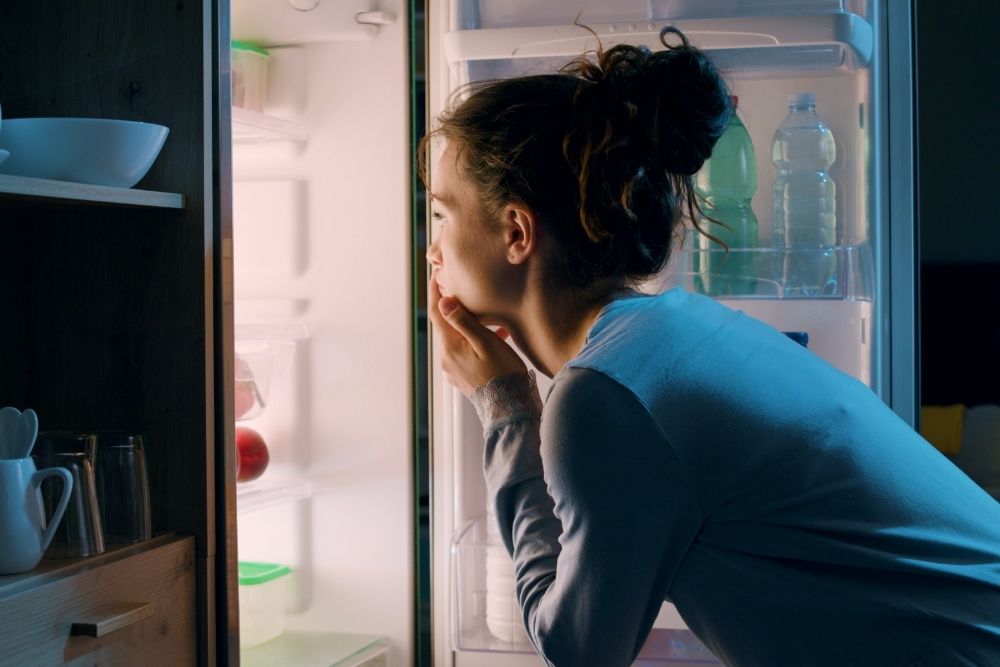The notion of a dinner bell—often a triangle struck with a metal rod which produced a loud ringing sound that would call people from their work to come together to eat—is not terribly common anymore. Its closest analog might be a parent shouting out the front door to bring the children back home for the evening meal when they have been playing outdoors.
Still, we like the image for this fourth entry in our series on healthy eating for those in recovery from a substance use disorder. You might think of our metaphorical dinner bell as chiming each time you encounter a good idea in this blog that you can use when planning meals that support your ongoing recovery.
We are also going to consider the late-night snack. Our last entry included some advice about the afternoon snack, so it is only right that we also consider the little treat you might be tempted by before you head to bed.
Before we proceed, here is a reminder: We are not nutritionists. For more specific information and advice about making good choices when it comes to food, we recommend talking with your doctor.
Let’s chow down on eating ideas for the evening.
Breaking Through Dinnertime Indecision
You have probably found yourself in one of those conversations in which you and a companion are trying to decide what to have for dinner. You both claim that you are flexible, but when one of you suggests something, the other rejects it. You find yourselves stuck—and hungry.
For some people, that challenge comes up night after night after night, and it can lead to some consistently unhealthy choices. We believe you can—and should—break out of that cycle. Here are a couple of suggestions for doing so:
- Plan (and even prep) your meals in advance. Deciding in advance on a series of meals that will get you through the week means less daily decision-making. A little time spent creating a plan once a week can truly reduce the stress you might currently be feeling each time dinnertime is looming.
- Learn to cook a variety of simple and quick dishes. Many times, the reason folks can’t figure out what to eat is that they have a very limited repertoire they cycle through over and over. Adding a few new recipes can quickly expand your options for delicious meals. We will have more to say about cooking in the fifth and final entry in this series. For now, here is a list of quick and healthy dinner recipes—and here is a similar list for vegetarians.
When choosing ingredients for your dinner creations, you can focus on the same sorts of foods we have been recommending for other meals: leafy greens, colorful fruits and veggies, lean proteins, and whole grains. These are the healthy foundations of a diet that support your recovery over time.
Remember that dinner bell and how we said it was sort of an old-fashioned way of calling people together for a meal? Sometimes it seems like actually dining together as a family or group of friends has gone out of style with the dinner bell. But getting together around a table and enjoying dinner and each other’s company builds stronger relationships. And those relationships support your recovery as surely as healthy food does.
Pick a Good Late-Night Snack
A lot of people—perhaps even yourself—get the munchies sometime between dinner and bedtime. Often, something sugary seems like just the thing, but if you want to get healthy sleep, which is absolutely essential to your recovery, you will want to rethink your approach to this final snack of the day.
Here are a couple of suggestions for your late-night snacking:
- Timing. The best time to have a late-night snack is about an hour before you plan to go to bed. As it happens, that is also a great time to power down your screens for the night to support quality sleep, which means you can think of these two habits as going hand-in-hand.
- Categories. There are some categories of food that you should avoid late in the evening. We have already mentioned that sugary snacks can be tempting, but probably are not the way to go. Similarly, you will want to avoid anything caffeinated, spicy, or heavy.
That list of rules might seem too restrictive, but the fact is, there are still plenty of healthy and satisfying options for your snack. Here is a list of good options for snacking before bed. The foods on that list and others like them provide magnesium, iron, zinc, omega-3 fatty acids, protein, and more. Each of those nutrients promotes more restful sleep.
We Are Here to Help You Reclaim Your Life
Wooded Glen Recovery Center, which is located near Henryville, Indiana, is consistently recognized as one of the nation’s top substance use disorder treatment centers in America by Newsweek magazine. You can count on us to provide effective treatment for substance use and co-occurring mental health disorders that is individualized for your specific needs.
We encourage you not to spend too much time chewing over the decision to get treatment. The sooner you let us help, the sooner you can reclaim your life.

